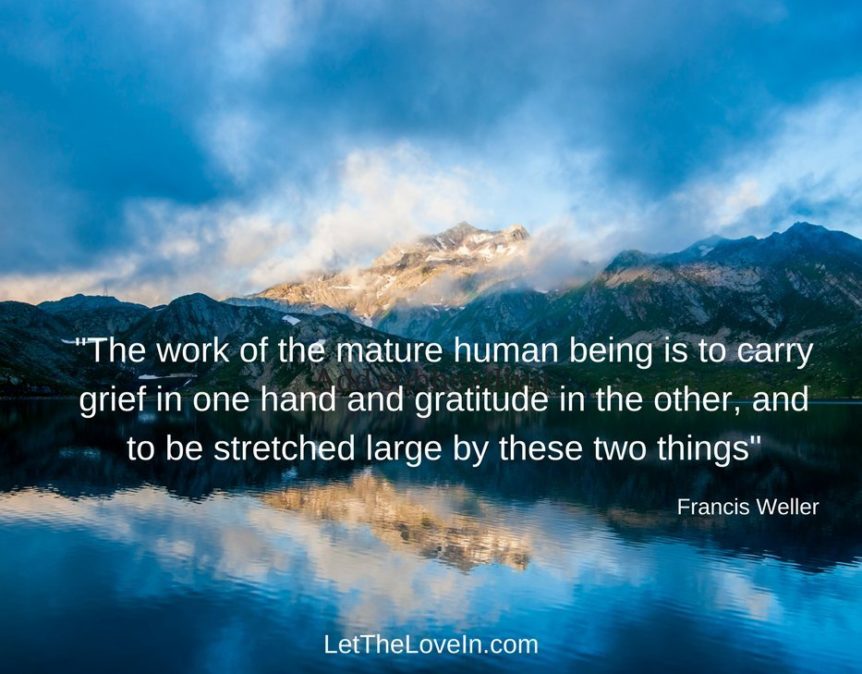“As we heal, it offers each of us an opportunity to consider what is most precious in our lives, release attachment and identification to what is not, re-examine our choices, and set a direction for our future that truly reflects our heart’s deepest wish.” ~ Gary Kraftsow, Founder, American Viniyoga Institute
After the death of my mom in 2007 I remember the profound grief of not wanting to carry on, a feeling of great emptiness and meaninglessness. In hindsight though, it is her death that lead me down the path of becoming a Yoga Therapist. I often wonder had she not died at 64 whether I would have made the decision to resign from corporate America, eventually finding the field of Yoga Therapy. In fact, Yoga philosophy tells us that we can influence the tone and direction of our mind and thus our overall health and well-being since the mind and body are inexorably linked. In this case, we can become grief alchemists if we are willing to see that potential.
Reggie Ray, Spiritual Director of Dharma Ocean, speaks of life in this way:“Life is about everything that happens in life. Often, it’s the moments we are trapped and stuck and suffocating that end up being the most important moments of your life because they are the moments when we are about to give birth…often in life we have a tendency to want to elevate the moments of insight and clarity and we want to put down the elements of claustrophobia and pain. But life doesn’t work like that…it’s like saying ‘I only want day, I don’t like night’ and trying to go about making day our permanent reality which in our culture is what people try to do. People can’t relate to darkness, they can’t relate to unknowing…it leads us to no growth.”
I’ll be sharing more as it relates to my experience teaching an upcoming 4-week series on grief with the Denver Hospice. Meanwhile, I thought I would share a bit more about the different types of grief and how it may manifest. Doing so may help those grieving realize where they might need more support through community or a health care provider such as a Yoga Therapist or Professional Counselor.
Different Types of Grief
In my hospice work, grief revolves around the loss of loved ones. This is a primary, natural or necessary loss but it may also be developmentally disruptive if the loss is of a parent early in one’s life. Other developmentally disruptive losses include job loss or diagnosis of a significant medical condition. A fourth type of loss is secondary. These losses are often ongoing and not as recognizable such as loss of faith, hopes and dreams or social isolation.
Grief is variable and chaotic depending on its cause and manifestation. Among the different manifestations of grief there is anticipatory, complicated (could include cumulative grief and even new grief), disenfranchised, cumulative, masked, traumatic and persistent.
Clients might present at any stage in the grief process: denial, anger, bargaining, depression or acceptance. This model for the stages of dying/grief was popularized by Elisabeth Kubler-Ross in her book, On Death and Dying. However, we now know that the process is not linear. As a way to cope, one could be in a state of acceptance (letting go) then suddenly find themselves in a state of denial (holding on).
Recognize How Grief May Be Affecting You
(Not an exhaustive list)
1) Physical: “being hit by a truck,” musculoskeletal tension, pain, headaches, jaw clenching, tightness in the chest, restlessness or fidgeting; 2) Physiological: shallow breathing, fatigue, sleeplessness, appetite changes, digestive stress, dry mouth, cardiac rhythm changes, increased sensitivity to noise, light, etc. and worsening of symptoms related to a chronic condition; 3) Cognitive: fogginess, feeling dazed, confused, disorganized, indecisive, forgetful or distracted; 4) Mood and Emotions: negative thinking, irritation, low motivation, sad and tearful, denial and anger; 5) Behavioral: lack of self-care, substance abuse, keeping belongings intact; 6) Spiritual: asking why, lack of meaning or purpose or alienation.
Yoga Therapy
What manifestations of grief are most challenging for the client? Once identified, I explore tools to help the client address them. We consider practice(s) that will link them to sources of inspiration, help you find meaning in life amidst the loss as well as faith and confidence. The process metabolizes grief, allowing clients to move forward with less resistance to what is. Tools may include:
- postures
- breathing
- meditation
- guided relaxation
- community resources/grief groups (sangha) such as The Grief Recovery Method
- self-study/reading inspirational books
Please note that when grief is escalated and, or persists there can be more serious manifestations such as panic disorders, the inability to experience pleasure, re-connect or form new relationships, thoughts of suicide and, or persistent post-traumatic stress. In these cases and, or at any time you feel you need support, you are strongly encouraged to seek the help of your primary care physician or other health care provider.
This information is for general educational and informational purposes only. Such information is not intended nor otherwise implied to be medical advice. Such information is by no means complete or exhaustive, and that as a result, such information does not encompass all conditions, disorders, health-related issues, or respective treatments. Always consult your physician or other healthcare provider to determine the appropriateness of this information for your own situation or should you have any questions regarding a medical condition or treatment plan.
Yoga is also preparation for death (one of the five afflictions or klesas is the fear of impermanence) and so, it is through the dark nights of grief that we come to terms with our own mortality.
To learn more about how Yoga Therapy may help you, schedule a complimentary thirty minute session. Other resources that may be of help include: The Grief Recovery Method and Grief Support Network (Boulder based).

